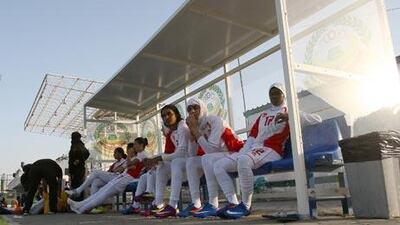The women's national football team have yet to celebrate the second anniversary of their first 11-a-side match, but they already seem ready to go head-to-head with Asia's top sides.
More UAE sport
Swimming World Cup's whistle-stop tour rolls into Dubai. Read article
Ignacio Scocco and his long path to Al Ain. Read article
Coach Faikov delighted as Storms lash Scorpions in ice hockey. Read article
Debutant Palekar checks in for UAE against Afghanistan. Read article
The UAE won the West Asian Football Federation (Waff) tournament last year, defeating a well-regarded Jordan side in the final, and on Tuesday night they overpowered Syria 6-0 in their first game of the 2011 instalment.
"I think they have a strong side," said Hesterine de Reus, the Jordan coach. "They are organised, and the players look strong and skilful."
Syria clearly were overmatched, but the UAE's first XI demonstrated an impressive blend of athleticism, technique and tactical awareness.
Nearly the whole of the Emirati side seemed faster than their opponents, with the winger Dalila Zerrouki perhaps the quickest. Jamila Marek scored three goals and showed skill in the air not regularly seen in the women's game. And the holding midfielder Aicha Barbou led a steady and physical defence.
"They play an organised game because football is such a big part of UAE society and we all know the game," said Nadine Schtakleff, a recreational footballer who knows many of the women on the national side.
This is a big week for women's football in the UAE, with eight national teams from the Middle East competing in the Waff tournament at the Sultan bin Zayed Stadium in central Abu Dhabi.
The visiting sides are Bahrain, Iran, Iraq, Jordan, Lebanon, Palestine and Syria.
"This is a very good experience for all the teams," said Izzac Khalil, the coach of the Lebanon national side. "It is always good to play matches, and this tournament is very well-organised, the hotel and the transportation and the matches."
Sheikha Fatima is an important figure behind the tournament. "She supports women in everything, especially in education and sports," Schtakleff said.
Hassan Ajenoui, the Moroccan coach of the UAE side, hopes that the tournament will help spur the development of the women's game in the country.
"I would like to see a women's league here in the UAE," he said. "It would help build the foundation for the country and allow me to choose from many players."
He hopes to see the league in operation come April, but concedes that would correspond with the start of warmer weather.
"What is important is that the league should exist," he said. "We can worry about weather later."
Some Middle East sides, specifically Jordan and Lebanon, have attempted to qualify for a berth in the Fifa Women's World Cup; the UAE have yet to enter the competition.
"The goal in Jordan is to be the first country in the region to play in the World Cup," said De Reus, who played for the Dutch national team for 10 years. She said that Jordan's Prince Ali, a Fifa vice-president, has taken a keen interest in the Jordanian women's team "and he is very supportive of women in sports and women's football. And the federation recognised that they had a talented national team and some talented youth players, and they thought it might be possible to join the World Cup in 2015."
The women's tournament will expand from 16 to 24 teams in 2015, and Asia can expect to get four berths, up from three.
Jordan's push to reach the World Cup included matches in Europe during the summer and a visit to the Women's World Cup in Germany, a tournament won by Japan.
De Reus said: "A tournament like this one in Abu Dhabi is good for the teams, but sometimes it's good to play sides from outside the region, too."
Yesterday Jordan drew 2-2 with Bahrain.
Despite the UAE's impressive showings in the Waff tournaments, Ajenoui does not expect the national team to attempt to qualify for the Women's World Cup or the Olympics in the near future.
"I think it will be a long time," he said. "It's difficult for the girls here to play the game. But step by step we will get to our goals."

